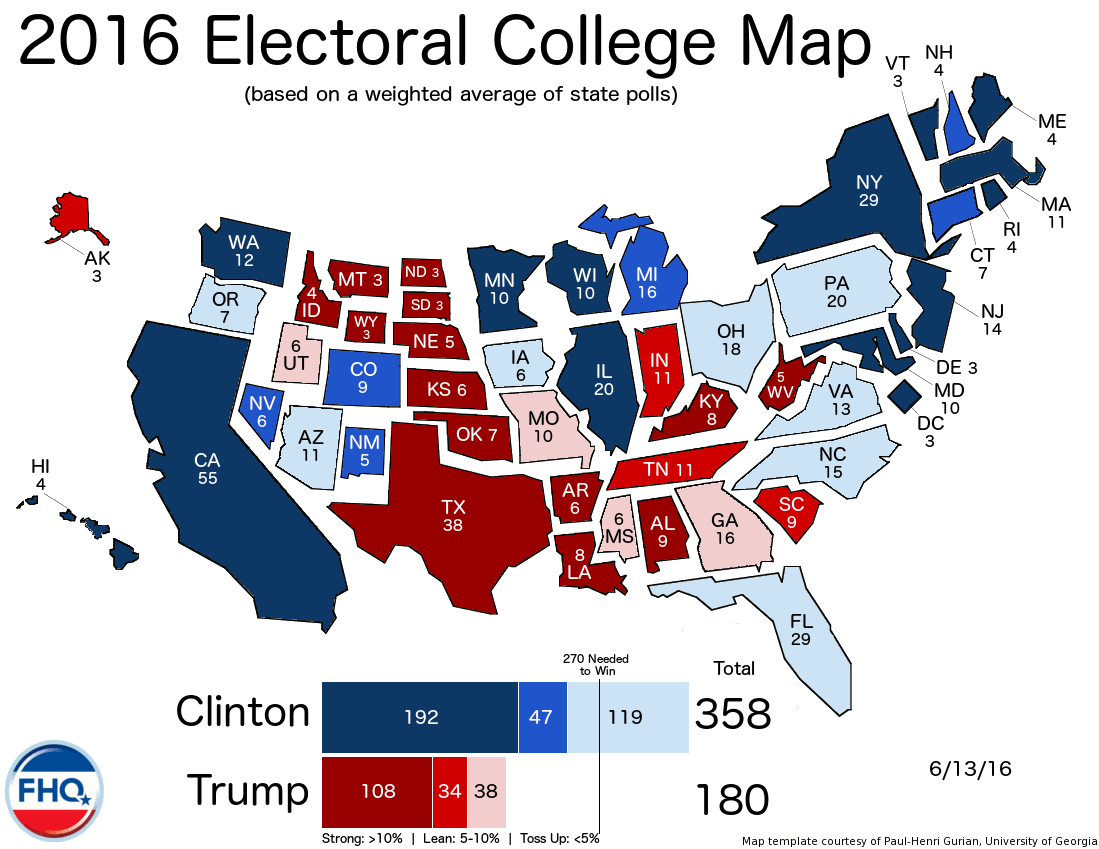 The United States presidential election of 2016, scheduled for Tuesday, November 8, 2016, will be the 58th quadrennial U.S. presidential election. Voters will select presidential electors, who in turn will vote for a new president and vice president through the Electoral College. The term limit established in the Twenty-second Amendment to the United States Constitution prevents the incumbent president, Barack Obama of the Democratic Party, from being elected to a third term. The 2016 election will determine the 45th President and 48th Vice President of the United States. - Where Do I Vote
The United States presidential election of 2016, scheduled for Tuesday, November 8, 2016, will be the 58th quadrennial U.S. presidential election. Voters will select presidential electors, who in turn will vote for a new president and vice president through the Electoral College. The term limit established in the Twenty-second Amendment to the United States Constitution prevents the incumbent president, Barack Obama of the Democratic Party, from being elected to a third term. The 2016 election will determine the 45th President and 48th Vice President of the United States. - Where Do I Vote The series of presidential primary elections and caucuses took place between February and June 2016, staggered among the 50 states, the District of Columbia and U.S. territories. This nominating process was also an indirect election, where voters cast ballots for a slate of delegates to a political party's nominating convention, who in turn elect their party's presidential nominee. Businessman and reality television personality Donald Trump became the Republican Party's presidential nominee on July 19, 2016, after defeating U.S. Senator Ted Cruz of Texas, Governor of Ohio John Kasich, U.S. Senator Marco Rubio of Florida and other candidates in the Republican primary elections.[1] If elected, Trump will become the oldest president to take office. Former Secretary of State and U.S. Senator from New York Hillary Clinton became the Democratic Party's presidential nominee on July 26, 2016, after defeating U.S. Senator Bernie Sanders of Vermont. If elected, she would be the first female president.
The series of presidential primary elections and caucuses took place between February and June 2016, staggered among the 50 states, the District of Columbia and U.S. territories. This nominating process was also an indirect election, where voters cast ballots for a slate of delegates to a political party's nominating convention, who in turn elect their party's presidential nominee. Businessman and reality television personality Donald Trump became the Republican Party's presidential nominee on July 19, 2016, after defeating U.S. Senator Ted Cruz of Texas, Governor of Ohio John Kasich, U.S. Senator Marco Rubio of Florida and other candidates in the Republican primary elections.[1] If elected, Trump will become the oldest president to take office. Former Secretary of State and U.S. Senator from New York Hillary Clinton became the Democratic Party's presidential nominee on July 26, 2016, after defeating U.S. Senator Bernie Sanders of Vermont. If elected, she would be the first female president. Various third party and independent presidential candidates are also running in the election. Libertarian Party nominee and former Governor of New Mexico Gary Johnson has ballot access in all 50 states. Green Party nominee and former physician Jill Stein has ballot access in enough states to win the electoral college. Johnson and Stein (who also ran as their parties' presidential nominees in the 2012 election) have appeared in major national polls. At least 24 other third party candidates and independents will appear on the ballot in at least some states, or are running as write-in candidates. Independent candidate and former Chief Policy Director for the House Republican Conference Evan McMullin led in at least one opinion poll in his home state of Utah. No third party or independent candidate has carried a state since 1968.
Various third party and independent presidential candidates are also running in the election. Libertarian Party nominee and former Governor of New Mexico Gary Johnson has ballot access in all 50 states. Green Party nominee and former physician Jill Stein has ballot access in enough states to win the electoral college. Johnson and Stein (who also ran as their parties' presidential nominees in the 2012 election) have appeared in major national polls. At least 24 other third party candidates and independents will appear on the ballot in at least some states, or are running as write-in candidates. Independent candidate and former Chief Policy Director for the House Republican Conference Evan McMullin led in at least one opinion poll in his home state of Utah. No third party or independent candidate has carried a state since 1968.